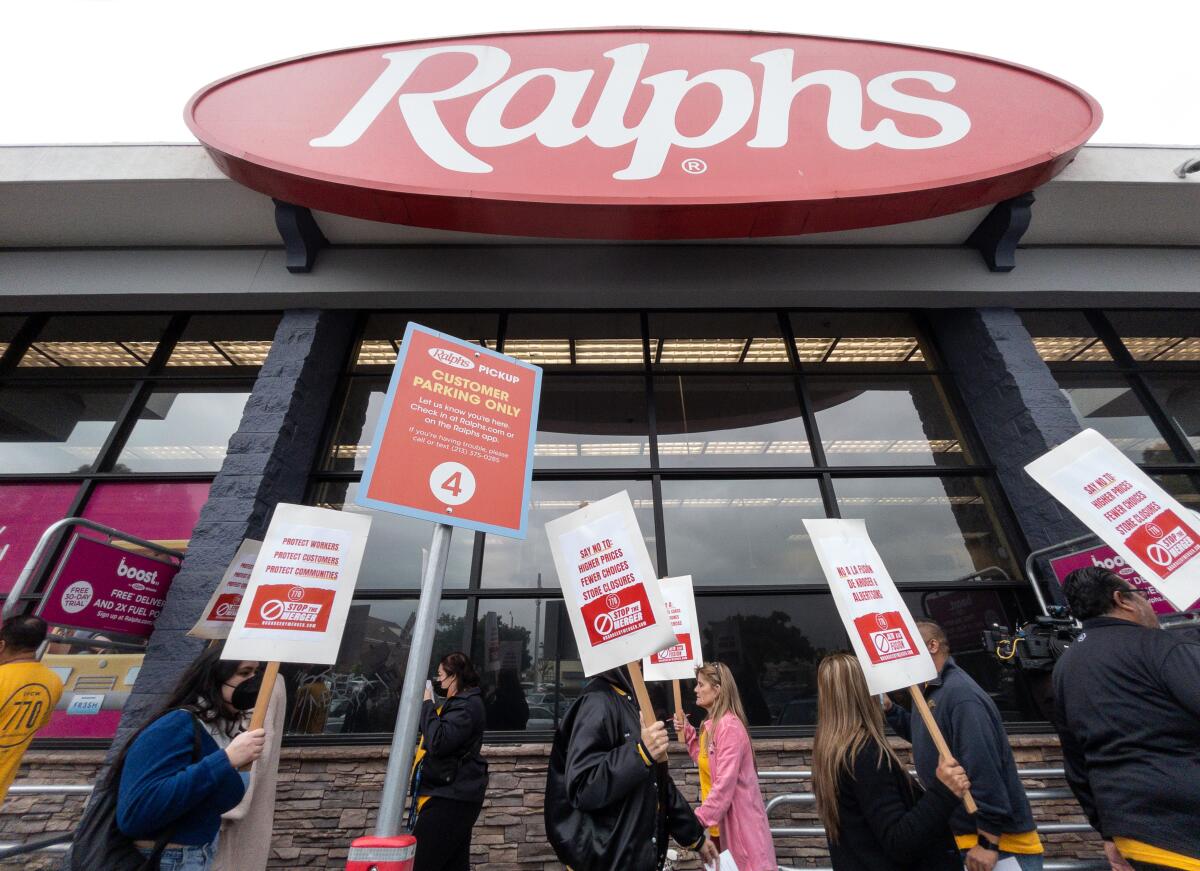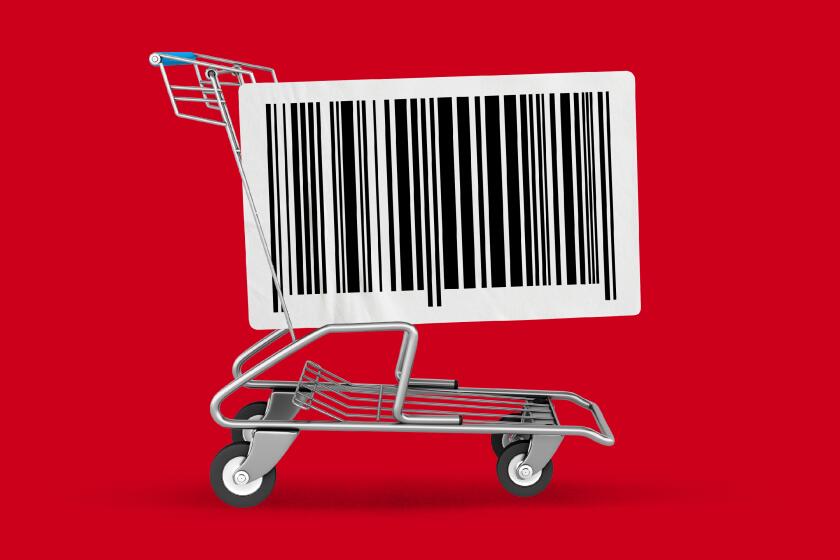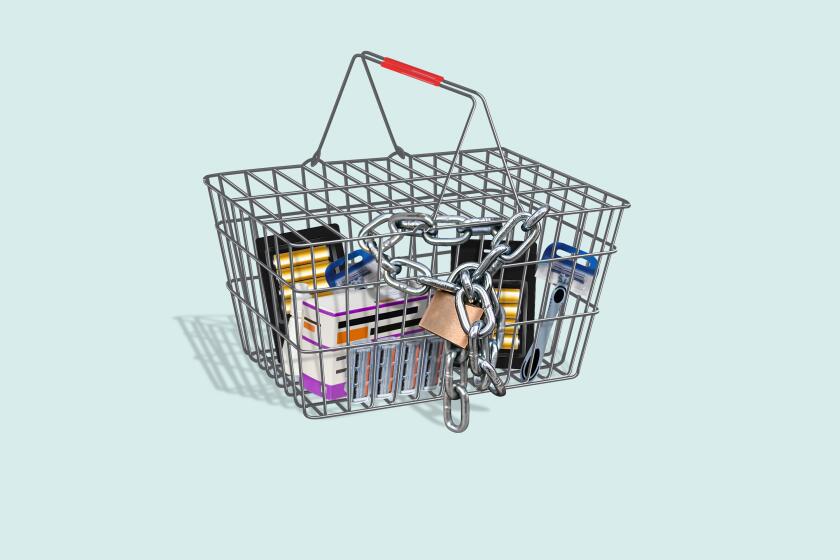Kroger-Albertsons mega-merger would cause grocery price hikes, FTC says in suit to block deal

- Share via
The Federal Trade Commission said it is suing to block supermarket giant Kroger’s bid to buy its smaller rival Albertsons because the combination would obliterate competition between the major grocers, leading to higher prices and lower-quality products for millions of Americans.
The regulatory agency said Monday that it authorized filing of a federal lawsuit that also alleges Kroger’s proposed $24.6-billion acquisition of Albertsons — the largest proposed supermarket merger in United States history — would hurt workers, eliminating their ability to negotiate for higher wages and better benefits.
The deal, announced in October 2022, would bring together Kroger’s collection of supermarkets, including the Ralphs chain, and Albertsons’ roster, including Vons and Safeway. The two chains have said they need to combine to better compete with retail giant Walmart and other grocery sellers.
The proposed merger comes during a prolonged rise in the prices consumers pay at grocery stores and restaurants. From 2019 through 2023, food costs rose 25% compared with the overall 19.2% increase in the consumer price index.
“This supermarket mega merger comes as American consumers have seen the cost of groceries rise steadily over the past few years,” said Henry Liu, director of the FTC’s Bureau of Competition in a news release. “Essential grocery store workers would also suffer under this deal, facing the threat of their wages dwindling, benefits diminishing, and their working conditions deteriorating.”
Two of the nation’s largest grocers with chains including Ralphs, Vons and Pavilions agree to merge to better compete with Walmart and Amazon.
Kroger is the nation’s second-largest supermarket chain, with a 10.1% market share, after Walmart, with a 23.6% share (not including its Sam’s Club chain, with an additional 4.7% market share), according to data firm Numerator. Costco is third with 9.2% of the market and Albertsons is fourth with 6.4%.
If the merger were completed, Kroger and Albertsons would operate more than 5,000 stores and about 4,000 retail pharmacies and employ nearly 700,000 workers across 48 states, according to the FTC.
Both companies, in response to the FTC announcement, said that they “look forward to litigating this action in court.”
When the deal was announced, Kroger Chairman and Chief Executive Rodney McMullen promised to use $1 billion in annual savings created by the proposed merger to lower prices, remodel stores and improve worker wages and benefits.
Kroger said Monday that it has “reduced prices every year since 2003.” Blocking the merger “will actually harm the very people the FTC purports to serve: America’s consumers and workers,” the company said.

“Kroger has a proven track record of lowering prices so more customers benefit from fresh, affordable food, and our proposed merger with Albertsons will mean even lower prices and more choices for America’s consumers,” the company said.
In California, the two corporations own nearly 800 stores and provide jobs to about 48,000 workers, said California Atty. Gen. Rob Bonta, whose office is joining the FTC suit along with attorneys general from seven other states and the District of Columbia.
“There’s no other way to say it: It’s bad for workers, it’s bad for agricultural producers, it’s bad for consumers in California and across the country,” Bonta said during a news conference in downtown Los Angeles.
Bonta said he is “especially concerned for communities in Southern California, including right here in Los Angeles, who would be particular at risk if this disastrous consolidation succeeds,” because in some neighborhoods a Kroger- or Albertsons-owned store is the only grocery option available.
Inflation hasn’t been this high in decades. We compiled a snapshot of prices at ten grocery chains in the L.A. area. How does your local store stack up?
Kroger and Albertsons tried to head off regulatory objections by agreeing in September to sell more than 400 stores and other assets to C&S Wholesale Grocers, which owns the much smaller Piggly Wiggly supermarket chain.
The FTC’s move drew praise from consumer groups and grocery worker unions.
“A Kroger-Albertsons merger would have been a disaster for workers, consumers and farmers, and represented the worst of grocery store consolidation,” said Lisa Gilbert, executive vice president of Public Citizen, a Washington, D.C.-based consumer advocacy group. “Today, the FTC said clearly that superstores cannot merge their way to dominance. We applaud the FTC for bringing a strong common-sense case, challenging this mega merger plan at a critical juncture for our markets.”
Grocery workers are “undoubtedly afraid” of effects of the proposed merger, Amber Parrish Baur, executive director of United Food and Commercial Workers’ Western States Council, said at the Monday news conference with Bonta. The UFCW has about 180,000 members in California, she said.
Baur pointed to a “disastrous merger” in 2015 between Albertsons and Safeway. Early that year, the companies divested itself of 146 Albertsons, Vons, Pavilions and Safeway stores throughout California, Oregon, Washington, Nevada and Arizona, selling them to Haggen, a Pacific Northwest company, to make the merger more palatable to federal regulators.
Drugstores are locking up more products, frustrating shoppers. The Times surveyed stores and found vastly different approaches to preventing theft.
But mere months later, Haggen announced it would close 27 stores, including 16 supermarkets in California. Soon after, Haggen filed for Chapter 11 bankruptcy and closed some 83 California stores, costing thousands of jobs.
“Many of our members lost their jobs. ... Communities lost access to food and medicine,” Baur said.
Kathy Finn, a longtime leader at United Food and Commercial Workers Local 770 in Southern California, said in a recent interview that the proposed merger would “impact California as much or more than any other state.” UFCW Local 770 represents nearly 30,000 members in Los Angeles, Santa Barbara, Ventura, San Luis Obispo, and Kern counties in the grocery, cannabis, retail drug, healthcare and packing industries.
Finn said in a Monday statement that California grocery workers and several UFCW locals across the country have “worked tirelessly over the past sixteen months, making sure their voices are heard loud and clear” through store actions and meetings with grocery company representatives.
“All our work has kept the voice of grocery store workers front and center in this story, while exposing the potentially harmful effects of this proposed merger to our communities, our stores and our jobs,” said Finn, who was elected president of Local 770 this month.
UFCW Local 555, which represents workers in parts of Oregon, southwest Washington, Idaho and Wyoming, recently broke with the national UFCW organization and other locals that have opposed the merger, and instead formally endorsed it.
Oregon Live reported that the decision came several weeks after union leaders met with representatives of C&S Wholesale Grocers, which has agreed to purchase 49 Oregon stores among the approximately 410 owned by Kroger and Albertsons it has pledged to buy if the Federal Trade Commission approves the merger.
President Peter G. Lurie of the Center for Science in the Public Interest said in a statement that the proposed merger could worsen marketing practices under which retailers and leading manufacturers “enter into cozy contractual relationships that place preferred brands of soda and other low-quality food items” in desirable locations such as checkout aisles and prominent floor displays.
Lurie’s organization in 2021 called on the FTC to investigate these practices. In 2022, the FTC asked retailers and manufacturers, including Kroger, to provide confidential information on trade promotion practices. The investigation is continuing.
“We look forward to the agency completing its work investigating current anti-competitive practices in the supermarket,” Lurie said.
More to Read
Inside the business of entertainment
The Wide Shot brings you news, analysis and insights on everything from streaming wars to production — and what it all means for the future.
You may occasionally receive promotional content from the Los Angeles Times.














